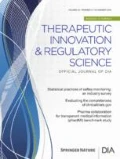Abstract
Adaptive designs are increasingly used in clinical trials. The Drug Information Association’s Adaptive Design Scientific Working Group (ADSWG) works to foster collaboration among regulatory agencies, academia, and pharmaceutical and biotech companies to further the science of adaptive clinical development. The ADSWG Survey Subteam has collected data on the usage of adaptive designs in clinical research from multiple sources, including a recent ADSWG survey regarding the perception and usage of adaptive designs in academia and industry for studies between 2008 and 2011, as well as barriers to usage; a literature review examining publications of adaptive design methodology and usage between 2000 and 2011; and a trial registry review of adaptive design references from 1996 to 2011. The comprehensive results of the ADSWG 2012 survey are provided in this article with comparisons to our previous 2008 survey, the literature and registry reviews, and recent surveys carried out by the US Food and Drug Administration (FDA) and the European Medicines Agency. Results of the ADSWG 2012 survey illustrate that industry and academia are showing more enthusiasm for adaptive trials, accompanied by an increase in the number of trials using designs described as less well understood in the FDA draft guidance on adaptive designs, published in 2010. The increased use of these methods in exploratory trials is consistent with the FDA draft guidance. The survey also identified several examples of successful marketing applications supported by confirmatory trials utilizing adaptive designs that were considered, at least at the time of the draft guidance, as less well understood. While some of the technological barriers to adaptive design usage identified in the 2008 survey are now less common, there are several important persistent barriers to usage. Organizations can help overcome these barriers through education, preplanning, and early engagement in discussions with the regulators.
Similar content being viewed by others
References
Quinlan J, Gaydos B, Maca J, Krams M. Barriers and opportunities for implementation of adaptive designs in pharmaceutical product development. Clin Trials. 2010;7:167–173.
Gallo P, Chuang-Stein C, Dragalin V, Gaydos B, Krams M, Pinheiro J. Adaptive designs in clinical drug development: an executive summary of the PhRMA working group. J Biopharm Stat. 2006;16:275–283.
Food and Drug Administration. Guidance for Industry: Adaptive Design Clinical Trials for Drugs and Biologics. Washington, DC: US Department of Health and Human Services; 2010.
Wang SJ, Hung HMJ, O’Neill RT. Paradigms for adaptive statistical information designs: practical experiences and strategies. Stat Med. 2012;31:3011–3023.
Kitazawa Y; KP2035 Study Group. Phase III double-blind study of latanoprost/timolol combination (KP2035) in patients with primary open-angle glaucoma or ocular hypertension [in Japanese]. Jpn J Clin Ophthalmol. 2009;63:807–815.
Satoh J, Yagihashi S, Baba M, et al. Efficacy and safety of pregabalin for treating neuropathic pain associated with diabetic peripheral neuropathy: a 14 week, randomized, double-blind, placebo-controlled trial. Diabetic Med. 2010;28:109–116.
Geiger MJ, Skrivanek Z, Gaydos B, et al. An adaptive, dose-finding, seamless 2/3 study of long-acting GLP-1 analog (dulaglutide): trial design and baseline characteristics. J Diabetes Sci Technol. 2012;6:1319–1327.
Skrivanek Z, Chien JY, Gaydos B, Heathman M, Geiger MJ, Milicevic Z. Dose-finding results in an adaptive trial of dulaglutide combined withmetformin in type 2 diabetes (AWARD-5). Paper presented at: American Diabetes Association 73rd Meeting; June 21–25, 2013; Chicago IL.
DIA adaptive designs in clinical trials: overcoming persistent barriers. Paper presented at: DIA Conference; November 29–30, 2012; Washington, DC.
Wang SJ, Hung HMJ, O’Neill RT. Uncertainty of effect size and clinical (genomic) trial design flexibility/adaptivity. In: The Proceedings of American Statistical Association (Biopharmaceutical Section) [CD-ROM]. Alexandria, VA: American Statistical Association; 2005.
Natanegara F, Neuenschwander B, Seaman JW Jr., et al. The current state of Bayesian methods in medical product development: survey results and recommendations from the DIA Bayesian Scientific Working Group. Pharm Stat. 2014;13:3–12.
Getz KA, Kim J, Stergiopoulos S, Birch P. Flexible, global, more adaptive: clinical trials 2.0. http://www.scripintelligence.com/home/Flexible-global-more-adaptive-clinical-trials-2.0-346528. Published September 12, 2013.
Coffey CS, Levin B, Clark C, Wittes J, Gilbert P, Harris S. Overview, hurdles and future work in adaptive designs: perspectives from a National Institutes of Health-funded workshop. Clin Trials. 2012;9:671–680.
Gaydos B, Anderson KB, Berry D, et al. Good practices for adaptive clinical trials in pharmaceutical product development. Drug Info J. 2009;43:539–556.
Author information
Authors and Affiliations
Corresponding author
Rights and permissions
About this article
Cite this article
Morgan, C.C., Huyck, S., Jenkins, M. et al. Adaptive Design: Results of 2012 Survey on Perception and Use. Ther Innov Regul Sci 48, 473–481 (2014). https://doi.org/10.1177/2168479014522468
Received:
Accepted:
Published:
Issue Date:
DOI: https://doi.org/10.1177/2168479014522468



